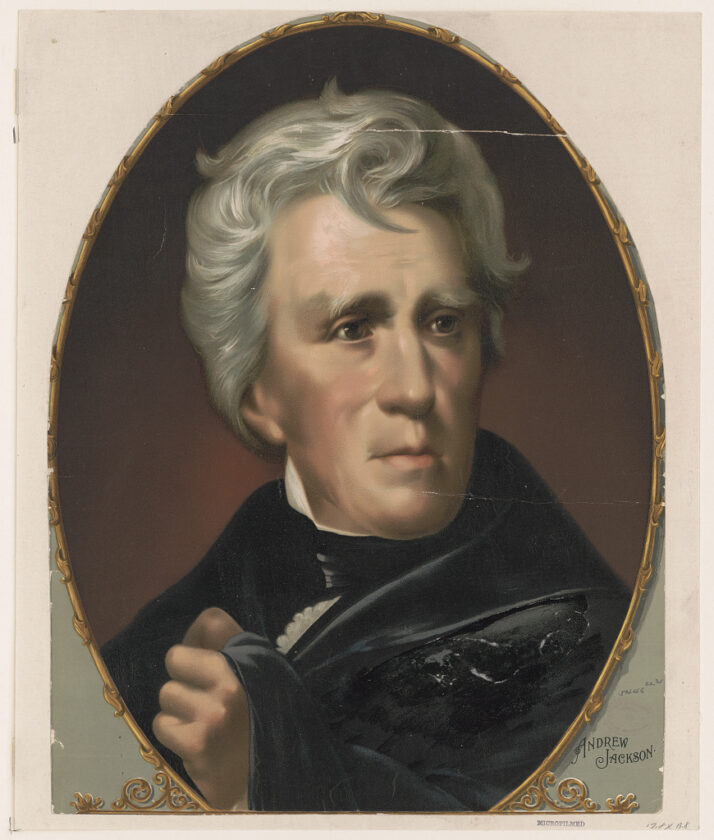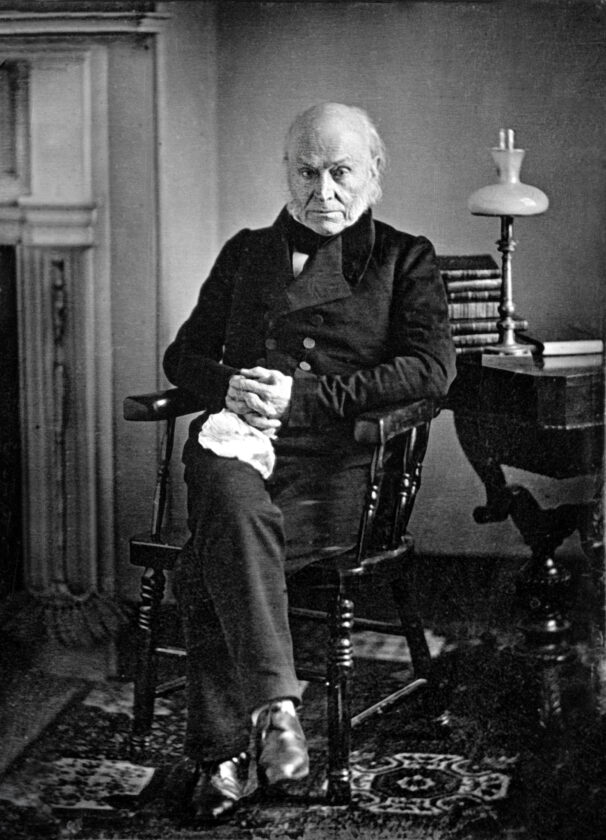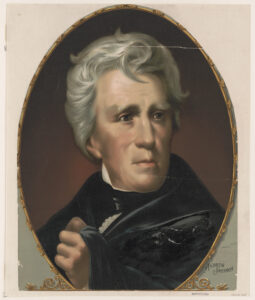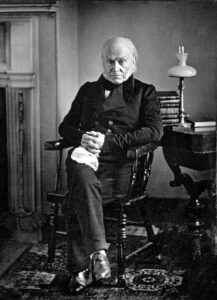First elections covered in Warren County saw Jackson, Adams repeatedly run for the White House

Library of Congress photo Andrew Jackson, the nation’s seventh president. Jackson’s two elections - 1828 and 1832 - appear to be the first to be covered in newspapers in Warren County.
- Library of Congress photo Andrew Jackson, the nation’s seventh president. Jackson’s two elections – 1828 and 1832 – appear to be the first to be covered in newspapers in Warren County.
- Public domain photo John Quincy Adams, the nation’s sixth president, was the first president to have his photograph taken in the 1840s. Adams defeated Andrew Jackson in 1824 but would then lose to Jackson in 1828. Presidential rematches sound familiar?
But the city’s population didn’t crest 1,000 until 1850.
Those early decades saw Warren as a scantily-populated frontier town.
As a result, many of the “modern” amenities of the 19th century – transportation infrastructure (roads, rail), local government, county government and newspapers.
For our purposes today, that means the first coverage of a presidential election that I can find in a county newspaper.

Public domain photo John Quincy Adams, the nation’s sixth president, was the first president to have his photograph taken in the 1840s. Adams defeated Andrew Jackson in 1824 but would then lose to Jackson in 1828. Presidential rematches sound familiar?
That takes us back 200 years to the election of 1824.
John Quincy Adams beat Andrew Jackson. The two men were members of the same party and had the same running mate but different inter-party alliances.
Four years later, the 1828 election was a rematch (which, until July, should sound familiar).
Jackson’s White House biography highlights his service in the War of 1812. Defeating the British at the Battle of New Orleans turned him into a national hero who, as president, “sought to act as the direct representative of the common man.”
“In his first Annual Message to Congress, Jackson recommended eliminating the Electoral College,” his biography states. “He also tried to democratize Federal officeholding…. Decrying officeholders who seemed to enjoy life tenure, he believed Government duties could be ‘so plain and simple’ that offices should rotate among deserving applicants.”
The Warren Gazette was not a proponent of Jackson, openly supporting his opponent, the incumbent John Quincy Adams.
“We are beat, fairly beat, of course we are sorry for’t,” the Gazette stated on Nov. 6, 1828.
“Although some of our brother Editors have calculated with apparent confidence on a majority in this state, we never could persuade ourselves to believe it would be the case, and have never on our own responsibility undertaken to assert it.”
There’s some hesitancy there to call an election result early. That sound familiar?
The county’s results were published in that edition: Conewango, 108 for Jackson and 40 for Adams; Brokenstraw, 58 for Jackson; 49 for Adams; Pinegrove, 61 for Jackson, 24 for Adams; Sugar Grove, 13 for Jackson, 78 for Adams; Columbus, 26 for Jackson, 27 for Adams; Springcreek, 38 for Jackson, 2 for Adams; Deerfield, 24 for Jackson, 15 for Adams and 13 for Jackson in Kinzua while Adams had eight.
The final total? 340-243 for Jackson.
They also reported the 1824 results that showed just 160 voters in Warren County – 153 for Jackson, 7 for Adams.
Not only does that show the population at the time but many of the municipalities we now know didn’t yet exist and were carved out of other municipalities throughout the 19th century.
“As to the result in this count, it is about as favorable as we expected some months ago it would be. Then, more recently we expected a different result,” the Gazette said.
“The most however, that we have ever said – the most we have ever ‘boasted,’ was that sufficient (evidence) had been seen, heard and known to justify the belief that there would be a majority for the administration.
That much we felt authorized to say from the presentation of respectable individuals living in the different townships.”
The Gazette made mention that Jackson’s men had an “organ” published in the county that claimed the result would be more than two-to-one for Jackson.
“It is believed there was scarcely a Jackson man in this count who did not vote. We have not heard of more than two or three, and they were absent,” the report said. “On the other hand we are credibly informed there were 15 Adams men in one township (Brokenstraw) who did not attend the election.
“We know of seven in this township who did not attend.”
The Gazette claimed that if voters could have voted without leaving their homes “there would have been a small majority for the (Jackson) administration.
“The fact is the Jackson men were more ‘zealous and active;’ they have taken more pains to organize their forces, circulated more tickets, electioneered harder and when they came to act on the day of the election had decidedly the advantage.”
That sounds similar to how elections are won today – momentum, organization, etc.
By 1832, a structure more similar to modern audiences started to take shape.
Jackson and Adams weren’t in the same party, though.
Jackson was a Democrat and Adams was a National Republican (not that kind of Republican). Additional descriptive adjectives detail the key issues in the race – Jackson was a nullifier while Adams was “Anti-Masonic.”
The Anti-Masonic piece can be best described as a quasi-“Drain the Swamp”-type effort. It was anti-elitism. Adherents believed Masons were controlling the country and were corrupt.
One source noted that the Anti-Masonic Party was the nation’s first third party as well as the first party to hold a convention and offer a platform.
The nullification piece isn’t quite as simple. Essentially, Jackson believed that a state government couldn’t override, or nullify, a federal law.
According to the Library of Congress, Jackson issued a proclamation to the people of South Carolina rejecting their effort to nullify multiple tariffs. (Tariffs should also be a familiar term to those following the 2024 election).
“As national politics polarized around Jackson and his opposition, two parties grew out of the old Republican Party-the Democratic Republicans, or Democrats, adhering to Jackson; and the National Republicans, or Whigs, opposing him,” his biography states.
“Henry Clay, Daniel Webster, and other Whig leaders proclaimed themselves defenders of popular liberties against the usurpation of Jackson. Hostile cartoonists portrayed him as King Andrew I.”
A true two party partisan system was born.
“The greatest party battle centered around the Second Bank of the United States, a private corporation but virtually a Government-sponsored monopoly,” the biography states. “When Jackson appeared hostile toward it, the Bank threw its power against him.
“Clay and Webster, who had acted as attorneys for the Bank, led the fight for its recharter in Congress. “The bank,” Jackson told Martin Van Buren, “is trying to kill me, but I will kill it!” Jackson, in vetoing the recharter bill, charged the Bank with undue economic privilege.
His views won approval from the American electorate; in 1832 he polled more than 56 percent of the popular vote and almost five times as many electoral votes as Clay.”
Four men would pick up electoral votes in 1832 – Jackson, Clay, John Floyd and William Wirt.
But it was a Jackson landslide.
The “Warren Voice of the People” was pro-Jackson and wrote about the 1832 election.
“It is with pleasure that we announce to our readers the triumphant result of the Presidential election in Warren County,” the Nov. 6, 1832 edition states. “Thus onward in march of principle.”
The report included township-level election results for Jackson for Warren County: 130 in Conewango, 80 in Pine Grove, 84 in Brokenstraw, 27 in Deerfield, 27 in Spring Creek, six in Elk, 24 in Kinzua, 68 in Columbus, 11 in Tionesta and 24 in Sugar Grove.
The county finished with a 296 majority for Jackson out of a total of 490 votes cast.
“A more firm minded patriotic people inhabits no country,” the Voice of the People claimed. “Democracy flows with her sons as pure as the limpid streams that roll through her valleys.”
Given the speed at which information moved, knowledge of the final outcome would take time to get to Warren County.
“We anticipate a glorious result throughout the Commonwealth, which will give certain victory to the nation,” the paper reported.
“But be that as it may we can rejoice abundantly that we have done our duty.
“The chicanery of anti-masonry has not moved us, the terrors of the British Bank has passed away like a New England witch story and the bargaining of masonry and anti-masonry has been treated with the merited contempt of a magnanimous epode.”
The issues that drove voters to the polls in that election are issues we simply can’t relate to.
A week later, the knowledge of Jackson’s victory was reported in the Voice of the People – “HUZZA FOR JACKSON!! GLORIOUS VICTORY!”
The publication took the opportunity to praise the county’s Jackson voters.
“There is virtue in the yeomanry of our western wilds, their bosoms are proof against the corruption of the cities,” they claimed. “They marched to the polls, determined to preserve the country by the reelection of one of the purse patriots of this or any other age.
“Let the heterogenous opposition boast and sneer as much as they please, they cannot prevent Andrew Jackson from being President – their laughter will be turned to weeping.”






